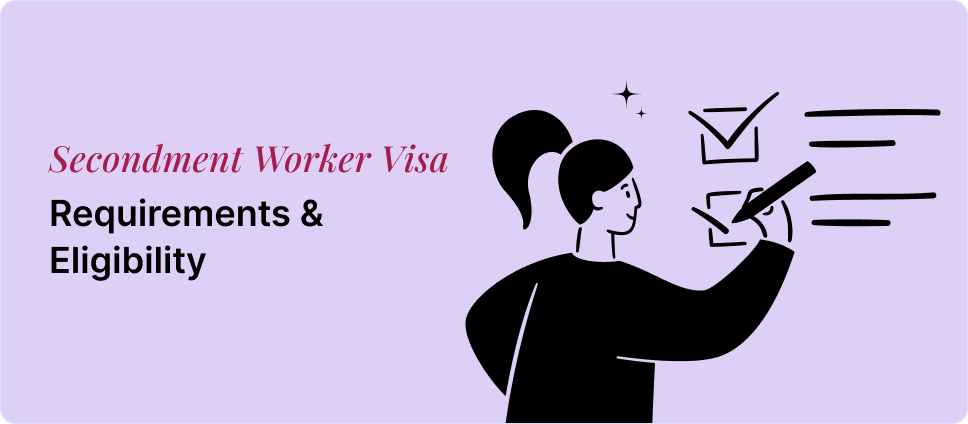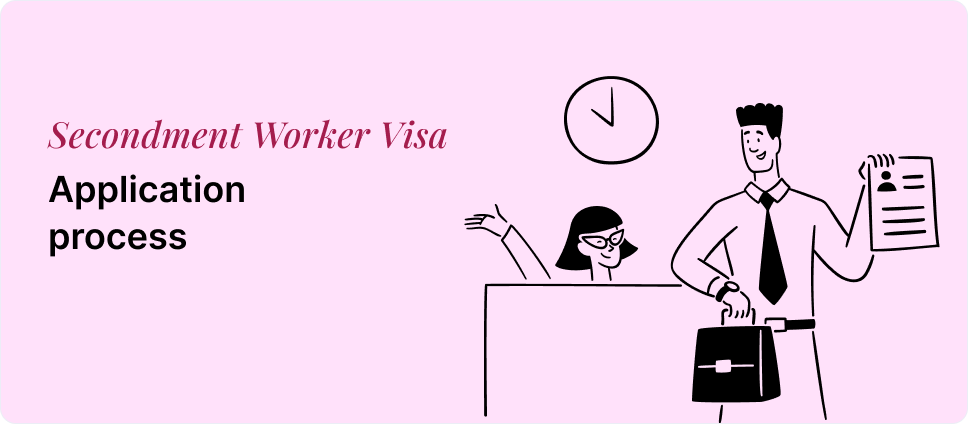Key Takeaways
The Secondment Worker Visa is part of the UK’s Global Business Mobility scheme. It requires applicants to be employed by an overseas company under a high-value contract (£50 million+), have worked for that company for at least 12 months, and possess a valid Certificate of Sponsorship.
Visa holders can initially stay for 12 months, with the option to extend for another 12 months, but the total stay is capped at 2 years.
The visa does not directly lead to settlement (Indefinite Leave to Remain), but holders can switch to other visa routes that provide a pathway to settlement.
Visa holders can bring dependents (spouse and children), study, and do voluntary work in the UK. However, they cannot access public benefits or take up additional jobs.
Services
Expert Assistance for Secondment Worker Visa
Secondment Worker Visa Consultation
Get personalised visa guidance tailored to your unique circumstances.
Secondment Worker Visa Applications
Maximise the chance of a successful outcome with expert help to prepare and submitting your Secondment Worker Visa application.
Appeal Secondment Worker Visa Refusal
We assist with appeals and reviews to give your Secondment Worker Visa application the best chance of success after a refusal.
Table of contents
What is the Secondment Worker Visa?
The Secondment Worker Visa, part of the Global Business Mobility scheme, allows overseas workers to undertake temporary assignments in the UK for a different organisation. To be eligible, the worker must be seconded as part of a high-value contract or investment by their overseas employer.
Holders of the Secondment Worker Visa can initially stay in the UK for up to 1 year, with the option to apply to extend for an additional year, allowing a maximum stay of 2 years under this visa. The complete list of licensed companies eligible to sponsor secondment workers is on the UK Register of Licensed Sponsors.
Global Business Mobility
Global Business Mobility was launched on 11 April 2022. The scheme includes five immigration routes, one of which is the Secondment Worker Visa. QC Immigration provides a live dashboard for the Register of Licensed Sponsors to see the complete list of companies with a sponsor licence for secondment workers.
Visa Pathway
The Secondment Worker Visa does not directly lead to settlement (Indefinite Leave to Remain) in the UK. However, visa holders may be able to switch to a different visa category that offers a pathway to ILR while in the UK.
Bringing Family Members
Secondment Worker Visa holders can bring their dependent family members, including their spouse and children, to the UK. Each dependent must submit an individual application and the required documents to prove their relationship with the primary visa holder.
A dependents’ visa will not automatically extend when the primary visa holder extends theirs; dependents must apply for extensions separately.
Benefits
Company Sponsor
Companies can retain highly valued team members and support their professional development by deploying their skills within a different organisation. This helps foster opportunities to build networks and partnerships across departments. Additional benefits include:
- No Immigration Skills Charge (currently £1,000 per year per worker) for sponsoring a Secondment Worker Visa.
- No general salary or "going rate" requirement. However, workers must be paid at least the UK National Minimum Wage.
Worker
As a Secondment Worker Visa holder, in addition to your work—which provides exposure to new practices, processes, and valuable international experience—you can:
- Study while in the UK.
- Bring your spouse, unmarried partner, or children as dependents.
- Do voluntary work.
- Travel abroad and return to the UK.
Eligibility & Requirements

The Secondment Worker Visa is part of the points-based immigration system. Applicants must score 40 points, which are awarded based on having sponsorship from a licensed company and having a job at the appropriate skill level.
| Points Requirement | Points |
|---|---|
| Sponsorship | 20 |
| Job at appropriate skill level | 20 |
Key eligibility criteria:
- The secondment must be part of a high-value contract between your overseas employer and the UK sponsor. A high-value contract is worth at least £50 million over the first five years and registered with the Home Office by your sponsor.
- You must be an existing employee of an overseas organisation that holds a high-value contract with your UK sponsor, which the Home Office approves.
- You must have worked for the overseas business for a cumulative period of at least 12 months outside the UK.
- You must have a valid Certificate of Sponsorship (CoS) for the job, listed in the Appendix Skilled Occupations. The CoS must have been issued within 3 months of making the application.
- You must be aged 18 or over.
- The job you will do in the UK must be on the list of eligible occupations.
UK Sponsor Requirements
The sponsoring company must hold a valid A-rated Global Business Mobility: Secondment Worker sponsor licence. The process of obtaining a sponsor licence can take several months, depending on the company's current status and specific requirements.
QC Immigration has a proven track record of helping companies successfully apply for a sponsor licence and maintain their ongoing compliance responsibilities. Please get in touch with us if you require assistance with this.
The sponsor must submit evidence of the high-value contract with their licence application as part of the application process. Additionally, the company can only issue Certificates of Sponsorship (CoS) related to that specific contract.
Financial Requirements

You must demonstrate that you and your dependents have sufficient funds to support yourselves upon arrival in the UK. Unless exempt, you must show evidence of maintenance funds amounting to at least £1,270.
These funds must have been held for at least 28 consecutive days, with the last day of this period falling within 31 days of your visa application date.
You will typically need to provide proof of these funds when applying unless you hold a valid visa and have been living in the UK for 12 months or more.
Job at Appropriate Skill Level
The applicant must be sponsored for a graduate-level role (RQF Level 6) listed in Appendix Skilled Occupations, and the job must be eligible for the Global Business Mobility routes.
The sponsor must select the most appropriate occupation code for the role and should not choose a less suitable code simply because it qualifies for the visa route.
Genuine Vacancy Requirement
It is essential to demonstrate that the job is legitimate, not a sham, and has not been created solely to enable the applicant to apply for permission to stay in the UK.
The Home Office must be satisfied that the job has reasonably met the requirements of the Global Business Mobility scheme. If there are concerns, this could trigger a compliance visit to the sponsor.
Required Documentation

When applying for a Secondment Worker Visa, you’ll need to submit the following:
- Sponsor information: The name of your sponsor and their sponsor licence number will be on your Certificate of Sponsorship.
- Proof of overseas employment: Evidence that you’ve worked for your employer outside the UK for at least 12 months.
- Certificate of Sponsorship reference number: Provided by your UK sponsor.
- Valid passport or other identity document: To confirm your identity and nationality.
- Job details: Including your job title and occupation code.
- Financial evidence: Bank statements or proof of savings to show you can support yourself in the UK (unless your Certificate of Sponsorship states that your sponsor will cover your expenses).
- Proof of relationship: If your partner or children are applying with you, provide evidence of your relationship.
- ATAS certificate: Required only if your role involves researching a sensitive subject at PhD level or higher.
- Tuberculosis (TB) test results: Required if you’re from a listed country.
During the application process, the Home Office may also request additional documents, which could include:
- Printed or online payslips, with online payslips supported by a letter signed by a senior staff member.
- Bank or building society statements.
- A building society passbook.
Fees
The standard application fee is £298.
You should also account for other costs, such as the Immigration Healthcare Surcharge, typically £1,035 per year.
If you opt for priority services or require certified translations, these will also incur additional fees.
Processing Time
Processing times usually take around three weeks.
To avoid delays, it’s advisable to apply well in advance of your start date. A priority service is available for an additional fee if you need faster processing.
How to Apply for a Secondment Worker Visa

Applications for the Secondment Worker Visa are submitted online through the UK Government website, and you can apply up to 3 months before your intended start date in the UK.
Step 1: Check Your Eligibility & Gather Supporting Documents
Before you begin, check that you meet the eligibility requirements for the Secondment Worker Visa. This includes working for your employer outside the UK for at least 12 months (unless exempt) and ensuring you have the required financial funds to support yourself.
Step 2: Verify Your Identity
European nationals (including those from Iceland, Liechtenstein, Norway, or Switzerland) and those applying within the UK with a Biometric Residence Permit can use the ‘UK Immigration: ID Check’ app to verify their identity.
If you're not eligible to use the app, you will need to schedule an appointment at a UK Visa and Citizenship Application Services (UKVCAS) centre to submit your biometric information (fingerprints and photograph).
Step 3: Complete the Online Application
Go to the official UK Government website and complete the online application form. Additionally, you’ll need to provide details about your immigration history, including any previous visas and your travel dates in and out of the UK.
Step 4: Submit Supporting Documents
Upload the required documents online for your application process, including your Certificate of Sponsorship (CoS), proof of financial requirements, and evidence of your employment with your overseas employer. Finally, agree to the online declaration.
Step 5: Pay the Fees
After completing your application form, pay the required fees online. This includes the visa application fee, the Immigration Healthcare Surcharge, and any fees related to your Biometric Residence Permit (BRP), if needed.
Step 6: Submit and Wait for a Decision
Once you have submitted your biometrics and uploaded all required documents, your application will be processed. The Home Office typically processes Secondment Worker Visa applications within 3 weeks. Faster processing options are available through priority services for an additional fee.
Step 7: Attend Your Biometric Appointment (If Required)
If applicable, attend your scheduled UKVCAS appointment to provide your biometric information. The visa application centre may retain your passport and other documents while processing your application.
Post-Approval for Secondment Worker Visa
Duration of Stay
With a Secondment Worker Visa, you can stay in the UK for:
- 12 months from the start date of your job, or
- The time listed on your Certificate of Sponsorship, plus 14 days—whichever is shorter.
If you want to stay longer, you can apply to extend your visa for another 12 months. However, the maximum stay allowed on this visa is 2 years.
Restrictions
While holding a Secondment Worker Visa, you are not allowed to:
- Access most public benefits or claim the State Pension.
- Change jobs unless you update your visa and meet the eligibility criteria.
- Take a second job.
- Apply for settlement (Indefinite Leave to Remain) in the UK.
Compliance Responsibilities
Both employers and employees must adhere to specific rules to stay compliant with the conditions of the Secondment Worker Visa. Below is a breakdown of responsibilities:
Employee Responsibilities
- Work Only in Specified Role: You can only work in the role and for the employer listed on their Certificate of Sponsorship.
- Job Changes: If the job role changes to a different occupation code, the employee must apply to update your visa, but they must continue working for the same employer.
Employer Responsibilities
- Record Keeping: Employers must maintain accurate records of the employee’s passport, visa, contact details, absences, job description, and payroll information.
- Overseas Operations: Employers must continue to maintain their overseas operations while seconding the worker to the UK.
- Accurate Reporting: The Home Office must be notified of any changes to the employee’s job role, salary, or employment status.
- Non-Compliance Reporting: If the employee breaches visa conditions, such as unauthorised absences, the employer must inform the Home Office.
Extending Your Visa
You can extend your Secondment Worker Visa for 12 more months before it expires as long as you meet the eligibility criteria. However, the maximum duration of this visa is capped at 2 years.
To qualify for an extension, you must provide evidence of ongoing eligibility and the validity of the secondment arrangement. This visa is designed for temporary assignments, not long-term residency.
Time Limits on Global Business Mobility Visas
Holders of Global Business Mobility visas, including the Secondment Worker Visa, are subject to a cumulative maximum stay of 5 years in any 6-year period across these visa categories:
- Graduate Trainee Visa
- Intra-company Graduate Trainee Visa
- Intra-company Transfer Visa
- Secondment Worker Visa
- Senior or Specialist Worker Visa
- Service Supplier Visa
- UK Expansion Worker Visa
Switching to Other Visa Categories
Secondment Worker Visa holders can switch to different visa routes while in the UK, provided they apply before their current visa expires. Each visa route has its own eligibility requirements.
Potential visa routes include:
- Family Visa (e.g., Spouse Visa)
- Global Talent Visa
- Innovator Visa
- Scale-up Visa
- Skilled Worker Visa
- UK Start-up Visa
For those seeking a pathway to Indefinite Leave to Remain (ILR), most visa routes require applicants to have lived in the UK for at least 5 years before applying for settlement. An exception is the Global Talent Visa, which may allow ILR after just 3 years.
Once ILR is granted, individuals can apply for British citizenship after an additional year of residency.
Get Help Applying for a Secondment Worker Visa
The Secondment Worker Visa offers businesses an excellent opportunity to send employees to the UK as part of a high-value contract. Employers are responsible for obtaining a sponsor licence and staying compliant with immigration regulations. Employees must work at the appropriate skill level specified in their Certificate of Sponsorship and adhere to all visa conditions.
Understanding the eligibility criteria, required documents, and application process takes time, as well as a good understanding of UK immigration law. Engaging a UK immigration lawyer can save time and improve your chances of success. If you need expert guidance, QC Immigration offers a trusted immigration advice service to help you navigate the complexities of the visa process and ensure a smooth application experience.
Author

Qiyin Chuah
Founder & Principal
Qiyin is a globally-recognised immigration law expert:
- Hong Kong iMoney Magazine interview on Business Immigration from High Net Worth Individuals (HNWI), 2016
- ITV News interview about the Tier 2 Work Visa quota and NHS staff shortages, 2018
- The LegalTech Book: The Legal Technology Handbook for Investors, Entrepreneurs and FinTech Visionaries on the subject of ‘Humanise with Lawtech Lawyering’ (publisher: Wiley, 2020)
- Goldman Sachs 10,000 Small Businesses UK National cohort alumni, 2021
Qiyin is an industry expert with more than 15 years of legal experience. She graduated from the University of Manchester with an LL.B (Hons) in Law and an LLM in International Business Law. Initially trained in Corporate Law, she was inspired to pursue Immigration Law following a personal Visa experience. In 2011, Qiyin founded QC Immigration from frustration of the quality of client service in the market, plus the desire to build a healthier company culture. As a highly-skilled migrant herself, Qiyin fully understands the complicated circumstances and high expectations of our clients. She has proven victories in defending our clients’ businesses, children’s best interests, women’s rights, LGBT rights and challenging Home Office refusals. Our returning clients typically stay with us for over 6 years from obtaining their very first visa until British citizenship. Qiyin regularly provides mentoring, training and supervision to other lawyers in their pursuit for similar successes.